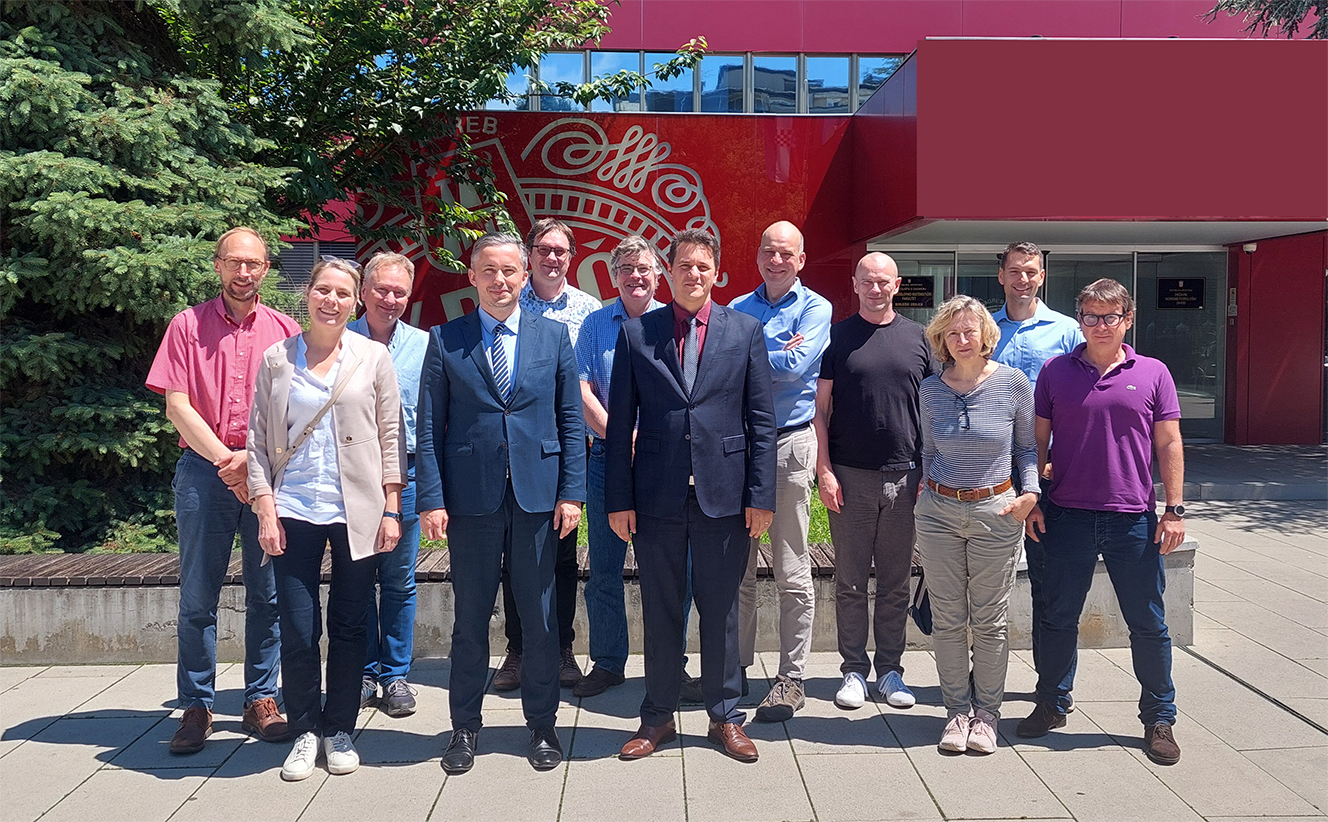News
Increasing Importance of Satellite Data in Air Quality Protection
DHMZ, 24 May 2024 - The Croatian Meteorological and Hydrological Service (DHMZ) hosted a Steering group meeting for one of the eight Satellite Application Facilities (SAFs) of the European Organisation for the Exploitation of Meteorological Satellites (EUMETSAT) on May 23rd and 24th, 2024.
The efforts of these Satellite Application Facilities (SAFs) play a significant role in advancing our comprehension of Earth's atmosphere, oceans, and land, thereby offering invaluable insights for addressing global challenges such as climate change, extreme weather events, and air pollution.
Members of the Steering Group for the Atmospheric Composition Monitoring Satellite Application Facility (AC SAF), comprising experts from a diverse array of European institutions, assembled in Zagreb. The mission of AC SAF is to process satellite data, develop and enhance software products, and create solutions based on sensors from EUMETSAT satellites. These solutions are customized for specific user communities and application areas, particularly emphasizing atmospheric chemistry, trace elements, aerosols, and atmospheric ozone.
The AC SAF builds algorithms, process, and interprets data to improve understanding of atmospheric chemistry, air quality, atmospheric pollution, and climate change. Its products support EUMETSAT member countries as well as EU in implementing environmental policies, addressing climate change, and safeguarding public health.
The focus of the Zagreb meeting was to ensure consortia stability, enhance the quality and precision of AC SAF products by identifying key challenges and planning for future advancements. Discussions also encompassed proposals for forthcoming projects and work programs, the encompassing user needs evaluation, identification of pivotal research and development areas, the strategic planning of future activities, and allocating necessary resources for their execution.
On the first day of the meeting, on behalf of the hosts, Izidor Pelajić, head of the DHMZ Operations Division, presented the activities of DHMZ and the completed and planned modernization projects to the AC SAF Steering Group members. On the final day of the meeting, Ivan Güttler, PhD, the Director-General of DHMZ, greeted the participants and highlighted the significance of Croatia's membership in EUMETSAT.
I’m pleased that we hosted this meeting, allowing experts to share knowledge and best practices. Observing the Earth from space is essential for making accurate forecasts, issuing warnings, and monitoring climate trends to help us better adapt to and lessen the impacts of climate change. I hope this meeting will lead to new insights and collaborations, improving our ability to carry out our tasks effectively and benefiting our citizens, communities, and the economy stated Güttler.
On behalf of AC SAF, Johanna Tamminen (FMI), Chair of AC SAF Steering Group, expressed sincere appreciation for the warm reception extended by DHMZ and invited DHMZ's air quality experts to participate in AC SAF's work.
Satellite observations have greatly improved during the last twenty years. They are now crucial for climate and environmental monitoring by providing reliable observations over the whole globe in a continuous manner, covering also areas that are difficult to reach by ground-based observations, emphasized Tamminen.
Just as satellite data have significantly improved the accuracy of weather forecasts, crucial for timely warnings on hazardous weather phenomena, they are increasingly indispensable for monitoring and modeling air quality. Integrating ground-based measurements with satellite data yields a comprehensive understanding of air quality, enabling the formulation of more effective strategies to safeguard human health and the environment.
Observations from space will become increasingly an indispensable tool to monitor the atmospheric chemistry, pollution, and emissions that influence the quality of the air we breathe. EUMETSAT not only operates the related satellites, but through the AC SAF EUMETSAT ensures the sustained and continued provision of information to users to support predictions, warnings, and decision-making. At its meeting today, the Steering Group assessed the latest developments towards new and improved information products and gave the green light for several product releases expected in the coming weeks, announced Lothar Schüller, EUMETSAT, SAF Network Manager.
Led by the Finnish Meteorological Institute (FMI), AC SAF brings together experts from institutions such as the German Aerospace Center (DLR), the Royal Netherlands Meteorological Institute (KNMI), the Danish Meteorological Institute (DMI), the German Weather Service (DWD), the Royal Meteorological Institute of Belgium (RMI), the Aristotle University of Thessaloniki (AUTH), the Belgian Institute for Space Aeronomy (BIRA-IASB), LaboratoireAtmosphères, Milieux, Observations Spatiales (LATMOS), the Université libre de Bruxelles (ULB), the Mariolopoulos - Kanaginis Foundation (MKF) and S&T Corporation.
Atmospheric Composition Monitoring Satellite Application Facility (AC SAF): An important part of EUMETSAT's network of experts
AC SAF is one of eight EUMETSAT SAFs, which together form a network that spans across Europe and consists of researchers, scientists, and experts from a diverse range of meteorological and technical institutes, universities, as well as private and public companies in 30 EUMETSAT member states.
European Organisation for the Exploitation of Meteorological Satellites: Monitoring weather, climate, and the environment from space
EUMETSAT is an intergovernmental organization with origins in the European Space Agency, established independently in 1986 with headquarters in Darmstadt, Germany. Its primary task is to plan, operate, and manage a system of meteorological satellites that observe the atmosphere, oceans, and land and provide timely and accurate weather and climate information to its member states. The EUMETSAT satellite system consists of the geostationary satellites Meteosat-10 and Meteosat-11, which are located above Europe and Africa, and Meteosat-9 above the Indian Ocean. EUMETSAT also cooperates with the National Oceanic and Atmospheric Administration (NOAA) of the USA to manage the two Metop polar-orbiting satellites. Together with the European Commission and the European Space Agency (ESA), EUMETSAT is a key partner in managing the Sentinel missions, the space component of the European Union's Copernicus program. Since 2006, Croatia, represented by the Croatian Meteorological and Hydrological Service (DHMZ), has been an active member of EUMETSAT.
